|
|
|
Sort Order |
|
|
|
Items / Page
|
|
|
|
|
|
|
| Srl | Item |
| 1 |
ID:
032133
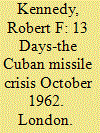

|
|
|
|
|
| Publication |
London, Macmillan, 1969.
|
| Description |
190p.hbk
|
|
|
|
|
|
|
|
|
|
|
|
Copies: C:1/I:0,R:0,Q:0
Circulation
| Accession# | Call# | Current Location | Status | Policy | Location |
| 003801 | 973.922/KEN 003801 | Main | On Shelf | General | |
|
|
|
|
| 2 |
ID:
127093
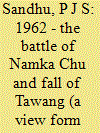

|
|
|
| 3 |
ID:
127487
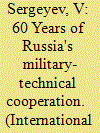

|
|
|
|
|
| Publication |
2013.
|
| Summary/Abstract |
THE SOVIET Chief Engineering Directorate (GIU, now FSVTS - the Russian Federal Service for Military-Technical Cooperation) was established in accordance with the USSR Council of Ministers Resolution No. 6749 of May 8, 1953. Colonel-General G.S. Sidorovich became the first chief of the GIU with a staff of 238 (160 army officers and 78 civilian employees), his deputies being Engineer Colonel M.A. Sergeychik and Rear Admiral G.V. Yurin.1
Of course, Soviet cooperation with foreign countries in the military-technical sphere had begun long before that, although perhaps it was from this time that it began to directly influence the foreign policy of our country.
|
|
|
|
|
|
|
|
|
|
|
|
|
|
|
|
| 4 |
ID:
061433
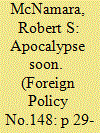

|
|
|
|
|
| Publication |
May-Jun 2005.
|
|
|
|
|
|
|
|
|
|
|
|
|
|
|
|
| 5 |
ID:
130636
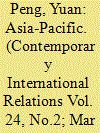

|
|
|
|
|
| Publication |
2014.
|
| Summary/Abstract |
The ability to build a new model of major-nation relations will hinge upon the long-term
peaceful cooperation between China and the United States. The author proposes a
roadmap to solve five problematic issues. All of these are essential for China and the U.S.
to co-exist peacefully and cooperate well in the Asia-Pacific region.
|
|
|
|
|
|
|
|
|
|
|
|
|
|
|
|
| 6 |
ID:
055218
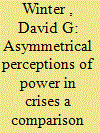

|
|
|
| 7 |
ID:
117427
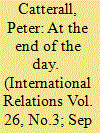

|
|
|
|
|
| Publication |
2012.
|
| Summary/Abstract |
Pre-publicity for the final volume of Harold Macmillan's memoirs, At the End of the Day, stressed that it would provide the British side of the Cuban missile crisis for the first time. The Churchillian model chosen, changes required by the Cabinet Office and Macmillan's desire to rebuke those political opponents who claimed that the crisis demonstrated a lack of British influence in Washington, however ensured a focus on his personal relationship with President Kennedy. His larding the text with contemporary observations from his diaries also skewed Macmillan's account and, in particular, underplayed the significance of British moves at the United Nations in New York to secure a credible United Nations inspection regime and a US guarantee of the inviolability of Cuba. Careful reconstruction of Macmillan's real-time experience of the Cuban missile crisis demonstrates the limitations of his own account of this event.
|
|
|
|
|
|
|
|
|
|
|
|
|
|
|
|
| 8 |
ID:
013783
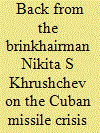

|
|
|
| 9 |
ID:
015244
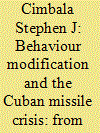

|
|
|
|
|
| Publication |
Sept 1992.
|
| Description |
252-284
|
|
|
|
|
|
|
|
|
|
|
|
|
|
|
|
| 10 |
ID:
014983
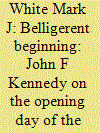

|
|
|
|
|
| Publication |
March 1992.
|
| Description |
30-49
|
|
|
|
|
|
|
|
|
|
|
|
|
|
|
|
| 11 |
ID:
110157
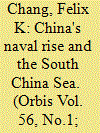

|
|
|
|
|
| Publication |
2012.
|
| Summary/Abstract |
Over the last fifteen years, the steady rise of China's naval capabilities has received a level of attention unmatched since the Soviet navy's expansion following the Cuban Missile Crisis. Yet much of that attention has focused on what that rise has meant for Taiwan's security or a possible contest with the United States.1 But Beijing's seaward territorial concerns also reach far into the South China Sea. And it is there that the military balance has most swiftly swung in China's favor as a result of its modernization program. This article will examine not only how the military balance has shifted, but also what Southeast Asian countries, particularly Vietnam and the Philippines, could do to best preserve their territorial interests in response to that shift.
|
|
|
|
|
|
|
|
|
|
|
|
|
|
|
|
| 12 |
ID:
120979
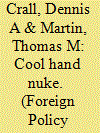

|
|
|
|
|
| Publication |
2013.
|
| Summary/Abstract |
How does presidential framing and signaling of problems affect the potential solutions available to solve those problems? For example, the Cuban Missile Crisis was immediately labeled a crisis and limited alternative solutions. Conversely, the Cienfuegos submarine base dilemma of 1970-despite having graver potential consequences-was never framed as a crisis, was out of the public eye, and was equally successful at repealing a Soviet threat. We offer a Force Dilemma model that suggests the president's problem definition process should produce crisis classifications sparingly, considering and employing less confrontational instruments of power, without prematurely sending unnecessary signals to adversaries, contemporaries, and the public.
|
|
|
|
|
|
|
|
|
|
|
|
|
|
|
|
| 13 |
ID:
060744
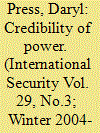

|
|
|
|
|
| Publication |
Winter 2004-05.
|
|
|
|
|
|
|
|
|
|
|
|
|
|
|
|
| 14 |
ID:
005221
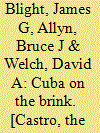

|
|
|
|
|
| Publication |
New York, PAntheon books, 1993.
|
| Description |
xxxvii, 509p.
|
| Standard Number |
0679421491
|
|
|
|
|
|
|
|
|
|
|
|
Copies: C:1/I:0,R:0,Q:0
Circulation
| Accession# | Call# | Current Location | Status | Policy | Location |
| 036265 | 327.7291/BLI 036265 | Main | On Shelf | General | |
|
|
|
|
| 15 |
ID:
063249
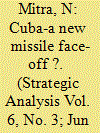

|
|
|
| 16 |
ID:
117430
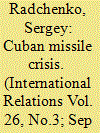

|
|
|
|
|
| Publication |
2012.
|
| Summary/Abstract |
This article reviews major issues in the historiography of the Russian/Soviet side of the Cuban missile crisis, as it has developed since the early 1990s. Focusing on key works, including Fursenko and Naftali's One Hell of a Gamble and Mikoyan's Anatomi'ia Karibskogo Krizisa, the article explores three issues: why Nikita Khrushchev decided to send missiles to Cuba, why he resolved to withdraw them, and how close the world came to 'the brink'. The author contends that in our understanding of the Kremlin's motivations in the Cuban missile crisis, we have come to over-rely on disparate pieces of 'evidence', which, at closer investigation, turn out to be one-sided, undocumented, or demonstrably false. The author therefore urges caution in drawing far-reaching conclusions from the crisis, especially in projecting its uncertain lessons onto the broader scholarship on the Soviet decision making during the Cold War.
|
|
|
|
|
|
|
|
|
|
|
|
|
|
|
|
| 17 |
ID:
006539
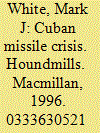

|
|
|
|
|
| Publication |
Houndmills, Macmillan, 1996.
|
| Description |
xv, 291p.
|
| Standard Number |
0333630521
|
|
|
|
|
|
|
|
|
|
|
|
Copies: C:1/I:0,R:0,Q:0
Circulation
| Accession# | Call# | Current Location | Status | Policy | Location |
| 038051 | 358.174/WHI 038051 | Main | Withdrawn | General | |
|
|
|
|
| 18 |
ID:
118309
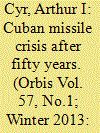

|
|
|
|
|
| Publication |
2013.
|
| Summary/Abstract |
The fiftieth anniversary of the October 1962 Cuban missile crisis is an appropriate time to review the events, which arguably were the closest the world has come to general nuclear war. The crisis was preceded by growing tensions between Moscow and Washington, and increasing Cuba emphasis in U.S. domestic politics. Analysts have differed on motives for trying to place long-range missiles in Cuba; Soviet officials consistently emphasized defense of Cuba. Revelations since the crisis indicate war was even closer than realized at the time. President John F. Kennedy deserves considerable credit for resisting military pressures.
The Cuban Missile Crisis of October 1962 arguably was the closest the world has come to nuclear war since the beginning of the nuclear era in 1945, and for that reason alone has been the focus of notable theatrical and literary products as well as scholarly analysis. The crisis has been described as President John F. Kennedy's "finest hour" in a touchingly brief tenure in the White House, and also as the direct result of weakness and miscalculation in the administration of that same American chief executive. Crisis management, a popular subject for analysis even before the crisis, received a major boost in visibility as a result of this unprecedented confrontation. The colorful personalities involved on both sides, including unpredictable Soviet Premier (Chairman of the Council of Ministers) Nikita Khrushchev, as well the photogenic and public relations-conscious U.S. leader, and some of their immediate advisers, have added to both human interest and dramatic potential. Finally, the crisis led to changes in strategic policies on the part of the United States and the Soviet Union, and their immediate allies. For these reasons and others, the half-century anniversary of the events merit a fresh look, both to review previous analyses and discuss lessons which bear on present-and future-international relations.1
The perceptions and conclusions among informed students of the Cuban Missile Crisis generally have shifted over the decades. At least in the United States, and among the international strategic studies community more generally, the initial reactions were generally laudatory of Kennedy and his men. Nuclear war had been avoided, while the goal of the removal of Soviet missiles from Cuba was achieved. Walt W. Rostow, a member of the Kennedy administration who later became national security adviser to President Lyndon B. Johnson, described the crisis as "the Gettysburg of the Cold War," a characteristic observation from this highly theoretical academic, but one which reflected wider sentiment. Later in the 1970s, as plots involving the U.S. government in efforts to assassinate Fidel Castro came to light, the Kennedy administration was regarded in a more critical light. During the same decade, information became public regarding JFK's reckless behavior in his personal life. That led at least some to analyze policies and politics of his administration with a much more critical perspective.2
|
|
|
|
|
|
|
|
|
|
|
|
|
|
|
|
| 19 |
ID:
061713
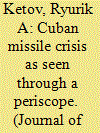

|
|
|
| 20 |
ID:
114700
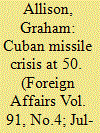

|
|
|
|
|
| Publication |
2012.
|
| Summary/Abstract |
Fifty years ago, the Cuban missile crisis brought the world to the brink of nuclear disaster. During the standoff, U.S. President John F. Kennedy thought the chance of escalation to war was "between 1 in 3 and even," and what we have learned in later decades has done nothing to lengthen those odds. We now know, for example, that in addition to nuclear-armed ballistic missiles, the Soviet Union had deployed 100 tactical nuclear weapons to Cuba, and the local Soviet commander there could have launched these weapons without additional codes or commands from Moscow. The U.S. air strike and invasion that were scheduled for the third week of the confrontation would likely have triggered a nuclear response against American ships and troops, and perhaps even Miami. The resulting war might have led to the deaths of 100 million Americans and over 100 million Russians.
|
|
|
|
|
|
|
|
|
|
|
|
|
|
|
|
|
|
|
|
|